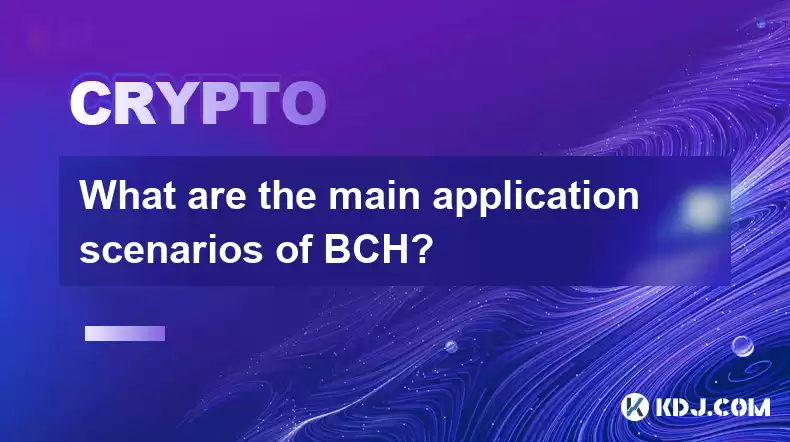-
 Bitcoin
Bitcoin $120100
1.16% -
 Ethereum
Ethereum $4329
2.25% -
 XRP
XRP $3.192
-0.22% -
 Tether USDt
Tether USDt $1.000
-0.01% -
 BNB
BNB $805.2
0.47% -
 Solana
Solana $178.7
-1.85% -
 USDC
USDC $0.9998
0.00% -
 Dogecoin
Dogecoin $0.2305
-1.62% -
 TRON
TRON $0.3445
1.17% -
 Cardano
Cardano $0.7940
-1.28% -
 Hyperliquid
Hyperliquid $44.44
-1.20% -
 Chainlink
Chainlink $21.86
-2.42% -
 Stellar
Stellar $0.4423
-0.15% -
 Sui
Sui $3.728
-3.84% -
 Bitcoin Cash
Bitcoin Cash $584.8
2.19% -
 Hedera
Hedera $0.2524
-2.87% -
 Ethena USDe
Ethena USDe $1.001
-0.02% -
 Avalanche
Avalanche $23.66
-0.78% -
 Litecoin
Litecoin $124.5
0.39% -
 Toncoin
Toncoin $3.399
1.77% -
 UNUS SED LEO
UNUS SED LEO $9.002
-0.44% -
 Shiba Inu
Shiba Inu $0.00001327
-2.10% -
 Uniswap
Uniswap $11.42
2.58% -
 Polkadot
Polkadot $3.957
-2.50% -
 Cronos
Cronos $0.1696
4.50% -
 Dai
Dai $1.000
0.00% -
 Ethena
Ethena $0.8139
3.04% -
 Bitget Token
Bitget Token $4.442
-0.38% -
 Monero
Monero $271.2
2.93% -
 Pepe
Pepe $0.00001168
-2.91%
What are the main application scenarios of BCH?
Bitcoin Cash (BCH) excels in fast, low-fee transactions, ideal for everyday purchases, POS systems, and microtransactions; its larger block size enables quicker confirmations than Bitcoin.
Mar 12, 2025 at 07:11 am

Key Points:
- Bitcoin Cash (BCH) prioritizes scalability and lower transaction fees compared to Bitcoin (BTC). This makes it suitable for everyday transactions.
- BCH's larger block size allows for faster transaction confirmation times, a crucial feature for point-of-sale systems and microtransactions.
- Several merchant services accept BCH, making it a viable option for businesses seeking faster and cheaper payment processing.
- The development community is actively working on improving BCH's functionality and adoption through various projects.
- While not as widely adopted as BTC, BCH holds a niche in the market for users prioritizing speed and affordability.
What are the main application scenarios of BCH?
Bitcoin Cash (BCH), a hard fork of Bitcoin, was created with a focus on improving transaction speed and reducing fees. This fundamentally changes its application scenarios compared to its predecessor. Unlike Bitcoin, which often faces congestion and high fees, BCH aims to be a more practical cryptocurrency for everyday use.
One primary application scenario is peer-to-peer (P2P) payments. The faster transaction speeds and lower fees make BCH a compelling option for sending and receiving money quickly and cheaply. This is especially beneficial in regions with limited access to traditional banking systems.
Another key application lies in point-of-sale (POS) systems. Businesses can integrate BCH into their payment infrastructure to offer customers a faster and more cost-effective alternative to credit cards or other payment processors. The lower transaction fees make it attractive for both merchants and consumers.
Microtransactions are another area where BCH excels. The low cost per transaction allows for smaller payments, which is ideal for applications like online gaming, content creation, and other services where users make numerous small payments. The speed ensures near-instantaneous transactions, enhancing the user experience.
The potential for BCH extends to international remittances. Sending money across borders can be expensive and time-consuming using traditional methods. BCH's speed and lower fees offer a potentially more efficient and affordable solution for individuals and businesses transferring funds internationally.
Several merchant services now accept BCH as a form of payment. This growing adoption is slowly increasing the accessibility and practicality of using BCH for everyday purchases. This provides users with an alternative payment method that bypasses traditional banking systems and associated fees.
The development community actively supports BCH through the creation and improvement of various projects and tools. These initiatives aim to enhance the usability and functionality of BCH, further expanding its potential application scenarios. This includes the development of wallets, merchant services, and other infrastructure necessary for wider adoption.
Beyond the basic applications:
BCH's potential extends beyond simple transactions. Its characteristics make it suitable for a range of innovative applications within the cryptocurrency space.
- Decentralized applications (dApps): BCH's faster transaction speeds and lower fees can facilitate the development and usage of dApps that require many transactions. This is a crucial factor for applications relying on frequent interactions.
- Supply chain management: Tracking goods and verifying authenticity throughout the supply chain can be achieved using BCH's transparent and immutable ledger. The lower costs compared to other cryptocurrencies make it more feasible for large-scale implementation.
Challenges and Considerations:
While BCH offers several advantages, it also faces challenges. Its market capitalization is significantly smaller than Bitcoin's, which can impact its price volatility and overall adoption rate. Furthermore, the ongoing debate within the Bitcoin community about scaling solutions continues to influence BCH's trajectory. The level of merchant acceptance, while growing, is still less extensive than for other cryptocurrencies.
How does BCH differ from Bitcoin (BTC)?
The primary difference lies in their block size and consequently, transaction throughput. BCH has a significantly larger block size, leading to faster transaction confirmations and lower fees. Bitcoin, on the other hand, has a smaller block size, which can result in network congestion and higher transaction fees during periods of high activity.
Is BCH suitable for everyday transactions?
BCH's design prioritizes its usability for everyday transactions. The faster transaction speeds and lower fees make it a more practical option for everyday purchases compared to Bitcoin. However, the level of merchant acceptance remains a crucial factor in determining its suitability for widespread daily use.
What are the risks associated with investing in BCH?
Like any cryptocurrency, investing in BCH involves risks. Price volatility is a significant concern, as the value of BCH can fluctuate significantly in short periods. Market sentiment, regulatory changes, and technological developments can all impact its price. Thorough research and risk assessment are crucial before investing.
How can I acquire BCH?
BCH can be acquired through various cryptocurrency exchanges. These exchanges allow users to buy BCH using fiat currencies or other cryptocurrencies. It's essential to choose a reputable and secure exchange to minimize the risks associated with trading cryptocurrencies. Some exchanges also offer BCH staking or other earning opportunities.
What are the future prospects of BCH?
The future prospects of BCH depend on several factors, including its ability to attract more merchants and users, further technological improvements, and overall market sentiment towards cryptocurrencies. Its focus on scalability and lower transaction fees could contribute to its long-term growth, but its success also hinges on factors beyond its technical capabilities.
Disclaimer:info@kdj.com
The information provided is not trading advice. kdj.com does not assume any responsibility for any investments made based on the information provided in this article. Cryptocurrencies are highly volatile and it is highly recommended that you invest with caution after thorough research!
If you believe that the content used on this website infringes your copyright, please contact us immediately (info@kdj.com) and we will delete it promptly.
- Bitcoin, Solana, MAGACOIN FINANCE: Navigating the 2025 Crypto Landscape
- 2025-08-12 00:30:13
- Cardano, ADA Holders, and Layer Brett: A Meme Coin with Real Utility?
- 2025-08-12 00:50:12
- Bitcoin, Michael Saylor, and Savvy Investors: A New Era of Digital Assets
- 2025-08-12 00:30:13
- Crypto Presales in 2025: Spotting the Next Big Thing with Analyst Insights
- 2025-08-12 00:50:12
- Cloud Mining in 2025: Bitcoin, Litecoin, and the Quest for Passive Income
- 2025-08-12 00:55:32
- Token Security, Agentic AI, Cybersecurity Guide: Navigating the New Frontier
- 2025-08-11 23:00:12
Related knowledge

How to purchase Aragon (ANT)?
Aug 09,2025 at 11:56pm
Understanding Aragon (ANT) and Its PurposeAragon (ANT) is a decentralized governance token that powers the Aragon Network, a platform built on the Eth...

Where to trade Band Protocol (BAND)?
Aug 10,2025 at 11:36pm
Understanding the Role of Private Keys in Cryptocurrency WalletsIn the world of cryptocurrency, a private key is one of the most critical components o...

What is the most secure way to buy Ocean Protocol (OCEAN)?
Aug 10,2025 at 01:01pm
Understanding Ocean Protocol (OCEAN) and Its EcosystemOcean Protocol (OCEAN) is a decentralized data exchange platform built on blockchain technology,...

Where can I buy UMA (UMA)?
Aug 07,2025 at 06:42pm
Understanding UMA and Its Role in Decentralized FinanceUMA (Universal Market Access) is an Ethereum-based decentralized finance (DeFi) protocol design...

How to buy Storj (STORJ) tokens?
Aug 09,2025 at 07:28am
Understanding Storj (STORJ) and Its Role in Decentralized StorageStorj is a decentralized cloud storage platform that leverages blockchain technology ...

Where to find the best price for Audius (AUDIO)?
Aug 11,2025 at 04:01pm
Understanding the Basics of Ethereum StakingEthereum staking refers to the process of locking up ETH tokens to support the security and operations of ...

How to purchase Aragon (ANT)?
Aug 09,2025 at 11:56pm
Understanding Aragon (ANT) and Its PurposeAragon (ANT) is a decentralized governance token that powers the Aragon Network, a platform built on the Eth...

Where to trade Band Protocol (BAND)?
Aug 10,2025 at 11:36pm
Understanding the Role of Private Keys in Cryptocurrency WalletsIn the world of cryptocurrency, a private key is one of the most critical components o...

What is the most secure way to buy Ocean Protocol (OCEAN)?
Aug 10,2025 at 01:01pm
Understanding Ocean Protocol (OCEAN) and Its EcosystemOcean Protocol (OCEAN) is a decentralized data exchange platform built on blockchain technology,...

Where can I buy UMA (UMA)?
Aug 07,2025 at 06:42pm
Understanding UMA and Its Role in Decentralized FinanceUMA (Universal Market Access) is an Ethereum-based decentralized finance (DeFi) protocol design...

How to buy Storj (STORJ) tokens?
Aug 09,2025 at 07:28am
Understanding Storj (STORJ) and Its Role in Decentralized StorageStorj is a decentralized cloud storage platform that leverages blockchain technology ...

Where to find the best price for Audius (AUDIO)?
Aug 11,2025 at 04:01pm
Understanding the Basics of Ethereum StakingEthereum staking refers to the process of locking up ETH tokens to support the security and operations of ...
See all articles

























































































